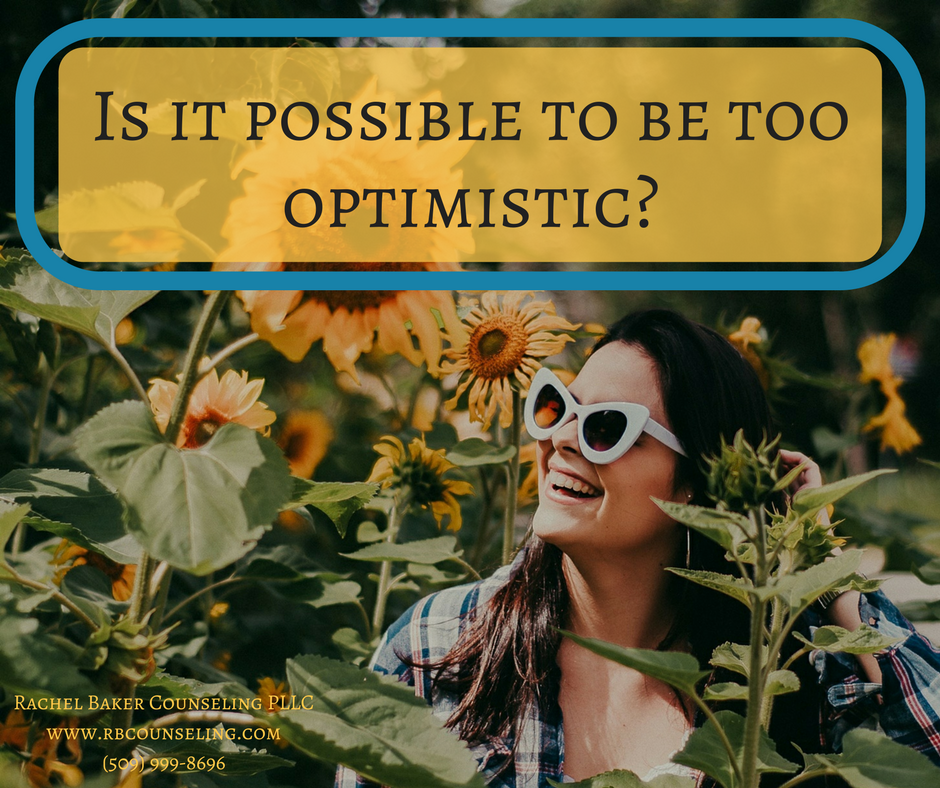Is it possible to be too optimistic?
A couple months ago, I mentioned going to a big basketball tournament. It was the called PK80 - honoring the 80th birthday of Phil Knight (founder of Nike). Of course the organizers incorporated all the latest technology, including an app that provided users with up-to-the-minute information about “everything PK80.” I was joking with a friend about how I wished someone would create an app for me! Without missing a beat, my dear friend responded with, “I’ll make you one! It’ll turn any negative saying into a positive one - just like you do.”
Later, I thought about her statement and what my friend was postulating. Clearly, she's saying I’m optimistic and I can't deny that.
Am I too optimistic? Is it actually possible to be too optimistic?
So, I’ve spent some time reflecting and meditating on these questions. Of course, my first inclination was that it's impossible to be too optimistic (another shining example of my optimism). My next thought was that complete optimism could be detrimental if the person was unable to see potential pit-falls and set-backs, right? Clients frequently tell me that they are pessimistic and play out worst-case scenarios in order to "prepare" for whatever may be coming. Do they have a point?
I know, clear as mud.
So lets take a look at the definition of 'optimism.' According to Merriam-Webster, the word was first known in 1759 and is currently defined as "an inclination to put the most favorable construction upon actions and events or to anticipate the best possible outcome." In other words, we have the ability to view whatever the world throws at us with a positive attitude. This attitude of hopefulness does not preclude us from setting goals, making plans, and taking steps that move us in a healthy direction. And, it certainly doesn't mean that we don't see a potential problems and act accordingly.
When it comes right down to it, I want to feel happy as much of the time as possible. This requires me to be aware of my thoughts (perceptions) in every situation I find myself. As mentioned above, people often tell me that they play out worst-case scenarios as a way to be prepared for whatever bad thing they are envisioning. While I think this is our brain trying to "protect" us from the unknown, I don't actually think it's helpful for these reasons:
How often have you worried about an incident, big or small, that turned out okay or even great? Mark Twain is quoted with saying, “I've lived through some terrible things in my life, some of which actually happened.” We can waste a lot of time and energy preparing for an event that never comes to fruition. In reality, you are prepared. You have the ability to stay in the present moment, with an optimistic outlook and still effectively deal with whatever crap comes your way.
We make the best decisions when we have as much information as available. When we look into the future, the missing information makes it impossible to make accurate and informed decisions. I call this "future tripping" and it's a waste of energy. Again, we need to stay in the present moment and make the best decisions we can with the information we have.
If a bad thing happens, it's going to suck. It will hurt, be scary or overwhelming despite all of the planning, scheming and prepping we do. The trick is to accept crappy things as they come, show ourselves compassion, and move on (I know, easier said than done at times, but this is the goal).
When I think about how I want to feel - happy, content, and at peace - optimism is the only answer. To be negatively wrapped up in future events that I cannot control, moves me farther away from how I ultimately want to feel. And, while some people are born more optimistic and others more pessimistic, we have the ability to increase our capacity for optimism. Read on for some ideas about how to make optimism your go-to mindset.
Would you like to increase your capacity for positive emotions? Try these techniques for increasing optimism in your life:
TELL A DIFFERENT STORY -- We are able to choose how we view all situations, so practice seeing an alternative perspective. For example, that a-hole who cut you off this morning on the freeway and is trying to ruin your day? An alternative story is that he just got news that his mother is in the hospital; he's distracted with worry. Another example, that woman who gave you a strange look as you passed in the grocery store, obviously she's got some kind of problem with you, right? An alternative story: she made that face because she is trying to hold in a fart as she passes you; her expression has nothing to do with you. We will feel more peace (or less peace) depending upon the meaning we give to the circumstances we're in.
STOP TAKING THINGS PERSONALLY -- In the book The Four Agreements by Don Miguel Ruiz and Janet Mills, the second agreement states: "Nothing other people do is because of you. It is because of themselves...Even when a situation seems so personal, even if others insult you directly, it has nothing to do with you. What they say, what they do, and the opinions they give are according to the agreements they have in their own minds." In the examples above, the initial thoughts about the man's driving behavior and the woman's facial expressions are a result of taking their actions personally - as if they are doing something purposefully and maliciously toward me. Increase your ability to 'tell a different story' by not taking other people's actions/reactions personally.
PRACTICE BEST-CASE SCENARIOS -- If your brain tells elaborate stories of worst-case scenarios, challenge yourself by creating just as vivid of a best-case scenario. For example, lets say your boss sends you an email in the morning saying she wants to see you in her office at 2:30 that afternoon. What are the first thoughts that flood into your mind? I'm going to get fired. She's going to ask me to work this weekend. A coworker complained about me. And, on and on. To counteract these worst-case scenarios, make a list of the same number of best-case scenarios: I'm getting a raise, my boss wants to compliment my hard work, I've accumulated too much vacation time and I need to take a few days off, and there's an opportunity for a promotion. What actually happens during that meeting at 2:30pm will more than likely lay somewhere between these two scenarios.
IN/OUT OF YOUR CONTROL -- Increase your ability to recognize and let go of things that are outside of your control. For example, you have no control over what someone thinks about you, someone else's feelings, or a mistake you made in the past. Literally, the only thing in the entire world that is within your control is YOU in the PRESENT moment. Period. You do not have control over external circumstances or people. You don't even have control over you in the past or in the future. When you find your brain ruminating over a situation (past, present or future), ask if you have control over the situation. If the answer is "no" (which it often is), practice letting it go - letting go of the worrying, planning and rehashing of events.



